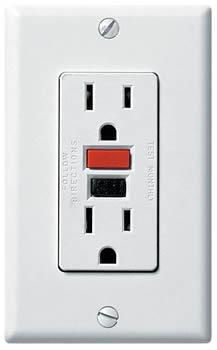Daily routines vary among people and families. It’s plausible as humans, to become so busy that we forget to inspect household items and appliances to ensure the safety of its residents.
In recent years, Texas has welcomed herds of new residents of all ages, genders, and lifestyles due to a good number of job opportunities and the affordable cost of living. Despite the countless daily routines Texans engage in, there are still 5 important habits every homeowner should conduct monthly to provide safety within their home.
GFCI

Ground Fault Circuit Interruptors is a safety device that helps reduce the risk of electric shock by shutting off when it detects current is running through the wrong path, such as a person or water. Generally, GFCI’s are installed in areas where appliances are near water i.e. sinks, tubs, etc. Since they are placed near water, it would be ideal to test these interruptors every month to help reduce the possibility of electric shock injuries. On each GFCI, there are two rectangular buttons between the two sockets. The top will always be the “Reset” button and the bottom is the “Test” button. To test, plug an appliance (nightlight, lamp) into a GFCI-protected outlet. Press the “Test” button and if the interruptor is functioning properly, the light should turn off. If your GFCI passed its monthly checkup, press the “Reset” button and unplug the appliance. If the light did not turn off during the test, discontinue use of that circuit and contact a professional electrician immediately.
Smoke Alarms
Every month, we dreaded the fire drills at school, not because there was a possibility of an actual fire taking place, but because the teacher would usually lecture us for not “clearing out quickly and efficiently”. Homeowners are encouraged to conduct monthly tests on their smoke alarms and replacing them after 10 years. To test your smoke detector, press and hold the red “Test” button, wait for a loud, alerting noise. If the sound is produced, your alarm is working properly.
Now that you are certain your detector is functioning well, it is still a good idea to assure the alarm will work in a fire. Smoke detector test aerosol can be found at hardware stores and may seem like a waste of a bottle, but rest assured that these sprays last for years. After the first part of the checkup, spray some aerosol into the detector and wait about 5-15 seconds. Once again, if the detector fails to wail, discontinue use and replace the unit immediately.
AC Filters
Air Conditioner filters are used to prevent dust and dirt particles from entering your AC system. Filters should be changed every 1-2 months however, if you or a loved one suffer from allergies, look into upgrading your filter or replacing them more often. Abandoned filters will continue to collect dirt particles that will eventually cause the your AC unit to ice up. This phenomenon restricts and blocks air from passing through, leaving residents with a warm, stuffy house.
Fuse Boxes and Circuit Breakers
In its simplest terms, a fuse box houses fuses and protects your household from overloaded circuits. If any wire is strained, you risk the possibility of blowing a fuse and your power will need to be restored. When you are ready to test your fuse box, you will find 3 things: The main switch, fuses or circuit breakers, and Residual Current Devices (RCD). Conduct a test every 3 months by pressing the “Test” button. The RCD should trip and your electricity will shut off. If this does not occur, contact a professional electrician immediately.
Electrical Cords
There are an infinite amount of cords lying around most American’s homes today. Many cords haven’t been used however, we always manage to collect an unnecessary amount of smartphone and camera charging cables. Conduct a monthly inspection of all electrical cords in the house.
- Frayed cables should be replaced to reduce the risk of electric shock from exposed wires.
- Unwrap tightly wrapped cords.
- Cover any unused outlets to prevent infant shock or burn injuries.
- Do not staple or nail cords to the wall. This can crush or cut the wires inside the cables, leaving you with a fire or shock hazard.
Lives get busy and it’s understandable to forget or put off monthly household checkups. Just remember, developing good habits will save you time, money, and guarantee your family’s safety for years to come.














